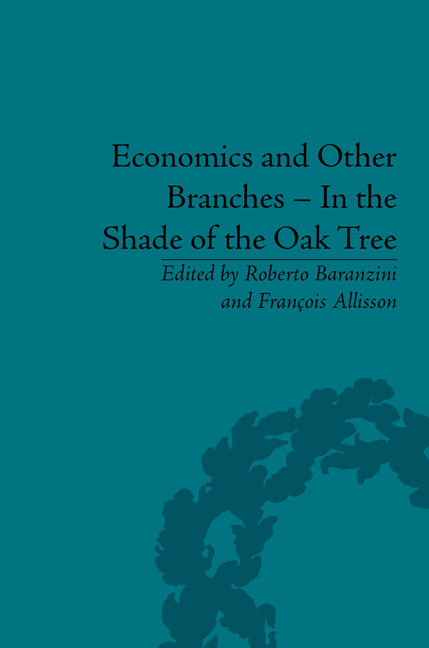Book contents
- Frontmatter
- CONTENTS
- List of Contributors
- List of Figures and Tables
- Introduction
- Pascal Bridel's Bibliography (up to 2013)
- Part I Léon Walras's Economic Thought
- Part II The Spreading of Thought
- Léon Walras's Reception
- The Lausanne School
- French Matters
- Cambridge UK
- Part III Monetary Theory
- Part IV Methodology
- Part V Economics and Humanities
- Economics and Social Sciences
- 23 Homo Œconomicus and Homo Sociologicus as Contrasted Ideal-Types
- 24 Social Sciences in Front of ‘Broad Questions’
- 25 Sociology: An Infirm Science?
- Some Insights from Visual Arts
- Part VI Economics and Civil Society
- Notes
- Index
25 - Sociology: An Infirm Science?
from Economics and Social Sciences
- Frontmatter
- CONTENTS
- List of Contributors
- List of Figures and Tables
- Introduction
- Pascal Bridel's Bibliography (up to 2013)
- Part I Léon Walras's Economic Thought
- Part II The Spreading of Thought
- Léon Walras's Reception
- The Lausanne School
- French Matters
- Cambridge UK
- Part III Monetary Theory
- Part IV Methodology
- Part V Economics and Humanities
- Economics and Social Sciences
- 23 Homo Œconomicus and Homo Sociologicus as Contrasted Ideal-Types
- 24 Social Sciences in Front of ‘Broad Questions’
- 25 Sociology: An Infirm Science?
- Some Insights from Visual Arts
- Part VI Economics and Civil Society
- Notes
- Index
Summary
By Way of Introduction
A discipline with mythical origins, an almost legendary genesis, with indefinite and undefinable boundaries, with uncertain and controversial results, sociology has always claimed for itself the right to be the science of society, the only scientific discipline entrusted with the study of the entire set of intersubjective relationships and the magnetic field they constitute.
The term sociology was first used in 1838 by Auguste Comte with the intention of designating ‘the science of the observation of social phenomena’. Since then, the term has been used to characterize empirical analyses and theories having social facts as their object, or all types and species of intersubjective relationships.
Now, the term sociology has two connotations-denotations. The first refer to the systematic study of the laws governing the social entirety in all its complexity; the second covers the analytical study of social groups and phenomena, which allows the formulation of general statements.
Both systematic study and analytical study are usually founded on assertions of a philosophical nature which we think to dodge by using various subterfuges, the most important of which is, still today, formalization. Sociology aspires to solve social problems. Its conceptual options give us the vocabulary to present such problems as well as the tools to solve them. The first and most fundamental of its options is this: the raison d'être of a society is not found in an exterior reality.
- Type
- Chapter
- Information
- Economics and Other Branches – In the Shade of the Oak TreeEssays in Honour of Pascal Bridel, pp. 343 - 362Publisher: Pickering & ChattoFirst published in: 2014



